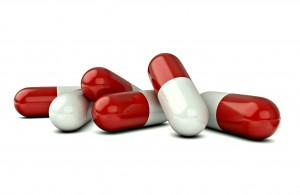Food Poisoning Bulletin has been reporting about the sub clinical use of antibiotics in farm animals for the past year. Many farmers routinely feed chickens, pigs, and cows antibiotics in their feed to prevent disease and to promote growth. The link between antibiotic dose and disease prevention may be obvious. But how do antibiotics promote growth?
 Mother Jones has a report connecting antibiotic use and weight gain. Regular low doses of antibiotics make animals gain weight because they change bacteria that live in the gut. The colonies of bacteria are called “microbiomes” and they can affect everything from allergies to the immune system to weight gain.
Mother Jones has a report connecting antibiotic use and weight gain. Regular low doses of antibiotics make animals gain weight because they change bacteria that live in the gut. The colonies of bacteria are called “microbiomes” and they can affect everything from allergies to the immune system to weight gain.
A study published in Nature last year found that low doses of antibiotics changed the bacteria in the intestines of mice. Those mice gained more weight than mice not given the drugs. The different bacteria were able to break down carbohydrates more readily so the body absorbed them and converted them to fat.
A paper published in the International Journal of Obesity looked at body mass and infant antibiotic exposure. Scientists found that antibiotic exposure in infants less than 6 months of age was associated with increased body mass. The paper concluded that “although effects of early exposures are modest at the individual level, they could have substantial consequences for population health.”
Last month the Government Accountability Project sued the FDA over information they have about how antibiotics are used in food animals. Many consumer and public interest groups want to know more about the drugs that are being used in our food supply because antibiotic resistant bacteria are becoming more prevalent. The obesity epidemic in America may be another reason to be concerned about this issue.




